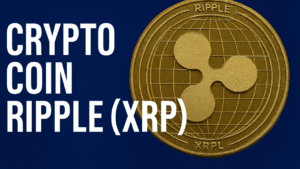 🚀 Understanding Crypto Coin Ripple (XRP): A Game-Changer in Global Finance
🚀 Understanding Crypto Coin Ripple (XRP): A Game-Changer in Global Finance
In the ever-evolving world of cryptocurrency, few digital assets have sparked as much intrigue and debate as crypto coin Ripple. Known by its ticker symbol XRP, Ripple stands apart from the crowd—not just as a coin, but as a transformative force in global payments. Whether you’re a seasoned investor or a curious newcomer, understanding the unique value proposition of crypto coin Ripple is essential in navigating the future of digital finance.
💡 What Is Crypto Coin Ripple?
Crypto coin Ripple refers to XRP, the native cryptocurrency of the XRP Ledger (XRPL)—a decentralized, open-source blockchain developed by Ripple Labs. Unlike Bitcoin or Ethereum, which focus on decentralization and smart contracts respectively, Ripple was designed with a singular mission: to revolutionize cross-border payments.
Ripple Labs, the company behind XRP, aims to bridge the gap between traditional banking systems and blockchain technology. By offering fast, low-cost, and scalable transactions, crypto coin Ripple has become a preferred solution for financial institutions seeking to modernize their infrastructure.
⚙️ How Does Ripple Work?
At the heart of Ripple’s ecosystem is the XRP Ledger, which uses a unique consensus protocol rather than energy-intensive mining. This allows XRP transactions to be confirmed in 3–5 seconds, with fees as low as $0.0002—making it one of the most efficient cryptocurrencies on the market.
RippleNet, the company’s enterprise-grade payment network, enables banks and payment providers to send money globally using XRP as a bridge currency. This eliminates the need for pre-funded accounts in foreign countries, reducing costs and improving liquidity.
Key Features of Crypto Coin Ripple:
- Speed: Transactions settle in seconds.
- Scalability: Handles up to 1,500 transactions per second.
- Low Fees: Micro-costs make it ideal for high-volume transfers.
- Eco-Friendly: Uses minimal energy compared to proof-of-work systems.
- Built-in DEX: The XRP Ledger includes a decentralized exchange for trading assets.
🌍 Real-World Use Cases
Crypto coin Ripple isn’t just theoretical—it’s actively reshaping how money moves across borders. Financial institutions like Santander, SBI Holdings, and American Express have explored or adopted Ripple’s technology to streamline international payments.
For example, a bank in Japan can use RippleNet to send yen to Mexico, converting it into pesos via XRP in seconds. This process bypasses traditional SWIFT systems, which can take days and incur hefty fees.
Ripple also supports micropayments, remittances, and tokenized assets, making it versatile beyond banking. Its ability to facilitate real-time settlement has positioned XRP as a strong contender in the race to digitize global finance.
📈 XRP vs. Other Cryptocurrencies
While Bitcoin is often seen as digital gold and Ethereum as a decentralized computing platform, crypto coin Ripple fills a different niche: liquidity and interoperability. It’s not trying to replace fiat currency or build decentralized apps—it’s trying to make money move as easily as information.
| Feature | XRP (Ripple) | Bitcoin | Ethereum |
|---|---|---|---|
| Transaction Speed | 3–5 seconds | 10–60 minutes | ~15 seconds |
| Fees | ~$0.0002 | ~$1–$30 | ~$0.50–$5 |
| Energy Use | Minimal | High (PoW) | Moderate (PoS) |
| Use Case | Cross-border payments | Store of value | Smart contracts |
🧠 Is Ripple Truly Decentralized?
This is a common question in crypto circles. While the XRP Ledger is open-source and run by independent validators, Ripple Labs holds a significant portion of XRP tokens. Critics argue this centralization could pose risks, while supporters claim it enables strategic development and stability.
Ripple has taken steps to decentralize further, including escrowing XRP holdings and encouraging third-party validator participation. The debate continues, but the technology’s performance remains impressive.
⚖️ Legal Challenges and Market Impact
Crypto coin Ripple has faced legal scrutiny, most notably from the U.S. Securities and Exchange Commission (SEC), which filed a lawsuit in 2020 alleging XRP was an unregistered security. The case has had major implications for the crypto industry, influencing how regulators view digital assets.
Despite legal hurdles, XRP has maintained a strong presence in the market. Its price has fluctuated, but its utility and adoption continue to grow. Many investors see Ripple as a long-term play, especially if regulatory clarity emerges.
🔮 The Future of Crypto Coin Ripple
As blockchain adoption accelerates, Ripple’s role in global finance could expand dramatically. With central banks exploring CBDCs (Central Bank Digital Currencies) and businesses seeking faster payment rails, Ripple’s infrastructure offers a ready-made solution.
Innovations like sidechains, NFT support, and smart contract capabilities are also being explored on the XRP Ledger, potentially broadening its appeal beyond finance.
📝 Final Thoughts
Crypto coin Ripple is more than just a digital asset—it’s a vision for a more connected, efficient financial world. Its speed, scalability, and real-world utility make it a standout in the crowded crypto landscape. Whether you’re investing, building, or simply learning, XRP offers a compelling case for the future of money.
As always, do your own research and consider your financial goals before diving into any cryptocurrency. But if you’re looking for a coin with purpose, performance, and potential, crypto coin Ripple might just be the one to watch.